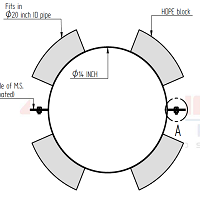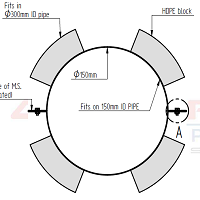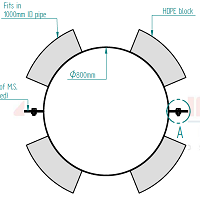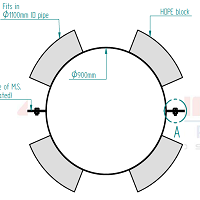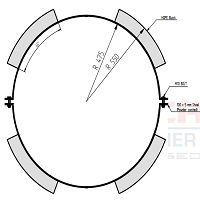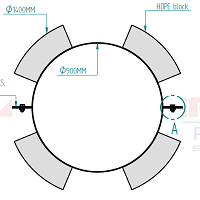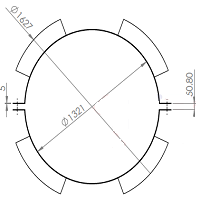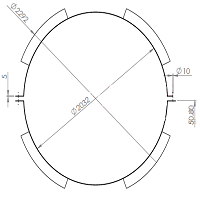HDPE Block Type Casing Pipe Spacer

HDPE Block Type Casing Pipe Spacer
View more
HDPE Block Type Casing Pipe Spacer
View more
HDPE Block Type Casing Pipe Spacer
View more
HDPE Block Type Casing Pipe Spacer
View more
HDPE Block Type Casing Pipe Spacer
View more
HDPE Block Type Casing Pipe Spacer
View more
HDPE Block Type Casing Pipe Spacer
View more
HDPE Block Type Casing Pipe Spacer
View more
HDPE Block Type Casing Pipe Spacer
View more
HDPE Block Type Casing Pipe Spacer
View more
HDPE Block Type Casing Pipe Spacer
View more
HDPE Block Type Casing Pipe Spacer
View moreCasing Pipe Spacer
Although casing spacers play a small part in the installation process of a water or sewer carrier pipe, the part they play is an important one.
Also known as casing insulators, they’re able to improve a carrier pipe’s performance, reliability, and life-cycle. In addition, insulators ensure accurate alignment, provide support, and reduce pipe installation time.
Why You Should Use Tecafine Casing Spacers
When you need to install a carrier pipe and casing, you’ll need a medium to fit between the empty annulus (the ring-shaped space between the carrier pipe and casing). For this, you’ll have two options, annulus filler or casing spacers. Unlike annulus filler, casing spacers can provide a number of benefits.
Repair
Main filler is sand that is used to fill the empty space between a carrier pipe and its casing. While annulus filler provides insulation, it can make performing repairs on the casing or pipe difficult. For example, if a repair needs to be made, sand will either escape or will need to be removed to reach the carrier pipe. Once the repair is done, the missing sand will need to be replaced.
With Tecafine casing Pipe spacers, there’s no need for filler as metallic spacers will keep the pipe centered and secured in its casing. This means that repairs can be done more efficiently
Variety Of Materials
Tecafine Casing Pipe Spacer can be made with a wide variety of materials. This can include stainless steel, carbon steel, polyethylene, epoxy-coated steel, and more. The material used is typically polyethylene or Rubber.
Costs
One of the biggest benefits that come with using Tecafine casing Pipe spacers is the opportunity to lower installation and maintenance costs. Annulus filler is not only expensive, but it requires extremely intensive labor and can act as an electrolyte, inviting unwanted current to the pipe. Tecafine casing Pipe spacers, however, eliminate the need for annulus filler. This results in efficient installation, repair, and replacement.
Pipe Integrity
When Tecafine casing Pipe spacers are installed on a carrier pipe, they provide protection to the pipe in a number of ways including:
- · Uniform support for the weight of the pipe
- · Electrical Insulation
- · Corrosion Protection
- · Keeping the carrier pipe and casing separate
Tecafine Casing Pipe Spacer Is Your One-Stop-Shop for Casing Pipe Spacers
Our team works hard to provide our customers with the best products and services available in the industry. We offer a wide range of insulator solutions through Casing Pipe Spacer that can be customized for your company’s unique needs. Give Tecafine Casing Pipe Spacer a call today and one of our experts will answer all of your questions.
Drawings
Casing Pipe Spacer
Tecafine Casing Spacer is used to support and electrically insulate a pipeline from a casing pipe through which it must pass. Typical uses of Casing Spacer include river, canal and bridge crossings, as well as road and rail crossings.
- Available Sizes – 100 mm to 5000 mm
- Available Width – 25 mm to 200 mm
- High Compression Strength.
- Low Co-efficient of friction
- Tensile Strength ~5000-7500 psi
- High Impact Strength
- High Hardness Level
- Uniform Support to Weight Of Pipe
- Weather resistance
- Chemical resistance
- Electrical Insulation
- Dimensional Stability
- Corrosion Protection
- Keeping the carrier and casing pipe separate
- Powder coated
- Precise VMC Machined
- Custom Made
- Stainless Steel Used
And much moreWith excellent dielectric resistance and low moisture absorption for minimal electric current loss and no impairment of cathodic protection, polyethylene spacers and insulators are an economical choice for use on all plastic pipe, metal pipe up to 3000mm diameter and smaller ductile pipe.
Polyethylene casing spacers and insulators are manufactured by injection molding using polyethylene, which provides high impact strength and a low coefficient of friction.
Polyethylene casing insulators are recommended for every 5 feet of pipeline. Molded into the inner surface of the casing insulators are grooves which prevent slippage of any carrier pipe coating. Lightweight, economical and easy to install, APS Polyethylene Casing Insulators require only a screwdriver for installation. Do not exceed 35 in-lbs of torque.
Polypropylene has a good friction coefficient due to its waxy surface with good sliding properties. The sliding friction coefficient is approx. 0.2 for PP on steel. In comparison to this, steel on steel is approx. 0.5. Therefore the abrasion is reduced to a minimum. The material is strong and yet fl exible and is therefore resistant to stress cracking. Flexibility of the body, stability of the skid form and excellent dielectric insulation are some more of the good characteristics of this material. Polypropylene has a higher temperature resistance compared to polyethylene. The base material is resistant from -20 °C to +100 °C.


